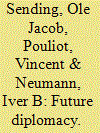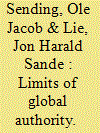| Srl | Item |
| 1 |
ID:
108089


|
|
|
| 2 |
ID:
073552


|
|
|
|
|
| Publication |
2006.
|
| Summary/Abstract |
Studies of global governance typically claim that the state has lost power to nonstate actors and that political authority is increasingly institutionalized in spheres not controlled by states. In this article, we challenge the core claims in the literature on global governance. Rather than focusing on the relative power of states and nonstate actors, we focus on the sociopolitical functions and processes of governance in their own right and seek to identify their rationality as practices of political rule. For this task, we use elements of the conception of power developed by Michel Foucault in his studies of "governmentality." In this perspective, the role of nonstate actors in shaping and carrying out global governance-functions is not an instance of transfer of power from the state to nonstate actors but rather an expression of a changing logic or rationality of government (defined as a type of power) by which civil society is redefined from a passive object of government to be acted upon into an entity that is both an object and a subject of government. The argument is illustrated by two case studies: the international campaign to ban landmines, and international population policy. The cases show that the self-association and political will-formation characteristic of civil society and nonstate actors do not stand in opposition to the political power of the state, but is a most central feature of how power, understood as government, operates in late modern society.
|
|
|
|
|
|
|
|
|
|
|
|
|
|
|
|
| 3 |
ID:
142240


|
|
|
|
|
| Summary/Abstract |
Global benchmarks (re)shape political conversations and institutionalise authoritative languages. It does not necessarily follow, however, that benchmarks can exert a lasting or significant influence over policies and behaviour of benchmarked actors. We analyse how the World Bank uses benchmarks to manage its relations with both donors and recipient governments. We analyse the role of the World Bank’s Country Policy and Institutional Assessment (CPIA), both at headquarters and in relation to the recent history of two countries in Africa: Ethiopia and Malawi. We find that the CPIA is not – and contrary to what one would expect from the CPIA’s nominal function and the literature on benchmarks – a very important tool for signalling incentives and allocating funds, or shaping the policy dialogue or the World Bank’s strategy in these two countries. Rather, the CPIA is used highly selectively as one factor among many in the negotiations between World Bank staff and governments. We conclude that the CPIA helps establish the World Bank as an actor that embodies global authority on development issues, including with donors, but that there is a tension between such global authority on the one hand, and concrete authority to shape policy in domestic contexts, on the other.
|
|
|
|
|
|
|
|
|
|
|
|
|
|
|
|
| 4 |
ID:
108099


|
|
|